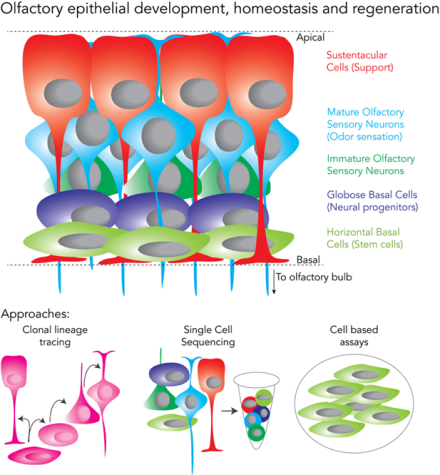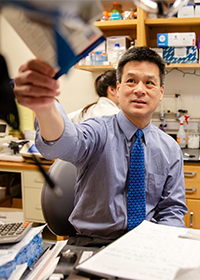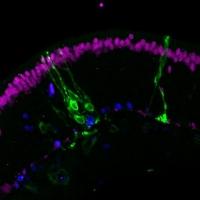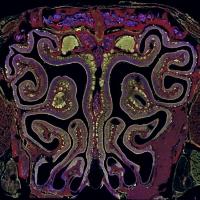
The Molecular Neurobiology Section aims to identify the molecular pathways regulating the construction and repair of neural circuits. Our primary model is the mouse olfactory epithelium (OE), which lines the nasal cavity and replaces dead and dying neurons throughout life via neurogenesis, or the homeostatic production of new neurons. The OE also completely repairs itself after acute damage. These two processes are supported by two distinct adult stem cell types: horizontal basal cells (HBCs) and globose basal cells (GBCs). HBCs are quiescent multipotent stem cells that are activated upon acute damage to the OE, and GBCs are neural progenitors that continuously produce new neurons.
Our lab studies the mechanisms that maintain the ability of these adult stem cell populations to generate new cells and repair damaged tissue. We use a variety of approaches, including single cell sequencing, clonal lineage tracing, mouse genetics, multiplexed RNA in situ hybridization, primary tissue culture, and confocal microscopy, to predict and test determinants of neural regeneration. We hope to harness this understanding to inform and improve biomedical interventions aimed at repairing the nervous system.


Principal Investigator
John J. Ngai, Ph.D.
Dr. Ngai is the Director of the NIH’s Brain Research Through Advancing Innovative Neurotechnologies® (BRAIN) Initiative. Dr. Ngai earned his bachelor’s degree in chemistry and biology from Pomona College, Claremont, California, and Ph.D. in biology from the California Institute of Technology (Caltech) in Pasadena. He was a postdoctoral researcher at Caltech and at the Columbia University College of Physicians and Surgeons before starting his faculty position at the University of California at Berkeley prior to joining NIH in 2020. Dr. Ngai has trained over 20 undergraduate students, 24 graduate students and 15 postdoctoral fellows in addition to teaching well over 1,000 students in the classroom. His work has led to the publication of more than 80 scientific articles in some of the field’s most prestigious journals and 10 U.S. and international patents.
Dr. Ngai has received many awards including from the Sloan Foundation, Pew Charitable Trusts, and McKnight Endowment Fund for Neuroscience. As a faculty member, Dr. Ngai served as the director of Berkeley’s Neuroscience Graduate Program and Helen Wills Neuroscience Institute. He also provided extensive service on NIH study sections, councils and steering groups, including as previous co-chair of the NIH BRAIN Initiative Cell Census Consortium Steering Group. Dr. Ngai currently oversees the long-term strategy and day-to-day operations of the NIH BRAIN Initiative as it strives to revolutionize our understanding of the brain in both health and disease.



